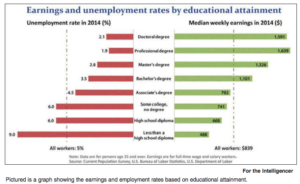Financial Advantages of Obtaining a College Education
In this article for my weekly column “Letters from Academia”, I discuss a recent article by The Economist that asks the question: “Is college education worth?”
College Education is Still a Worthwhile Investment
The March 28 edition of the prestigious magazine The Economist ran a cover story titled, “The whole world is going to university.” The piece began by saying that the American system of higher education is the biggest and best-funded in the world and because of that many other countries are imitating it, particularly when it comes to its funding model: a “mixed private-public funding and provision, with brilliant, well-funded institutions at the top and poorer ones at the bottom.”
The article went on to say, however, that America’s universities are a poor value for the money because, “The government rewards universities for research, and so that is what professors concentrate on.”
That is a debatable argument for several reasons. One of them is that state governments, which have traditionally provided most of the funding for public institutions, keep cutting budgets for education and they tend to do that across the board, regardless of how much research is done at universities.
The article also claims that because selectivity is a yardstick for measuring an institution’s prestige (and that of its graduates), “Good universities have little incentive to produce more graduates and to charge more to their students.” Again, this is not totally correct. Because of continuous budget cuts, postsecondary institutions have been forced to increase their enrollment as their main source of revenue. Also, because of diminishing state support, those same universities have been forced to increase their tuition and fees. The reason is very simple. Despite all the anti-tax rhetoric, money has to come from somewhere.
The article proposes that universities should be measured by their education performance so students (and their parents) know how to make better choices. In that regard they are totally right. Every time one visits the Web site of a college or university, one learns about their latest successes in sports, faculty scholarly achievements and fundraising triumphs. Yet, one rarely reads anything about how they measure how well their students have been prepared for their professional life, particularly when it comes to essential skills that go beyond basic knowledge in a discipline. Skills like critical thinking, communication, teamwork and problem solving are rarely mentioned. Yet, these are exactly the skills that are required in life no matter what profession one chooses.
One larger problem we are facing these days is the increasing rhetoric by politicians and media pundits that even suggest that a postsecondary education is too expensive a proposition for what is gained. This is only feeding the anti-intellectualism that is becoming established in the American discourse. As much as this populism is becoming widespread, the facts run unambiguously counter to that very notion.
In the chart that accompanies this article we can see the 2014 information presented by the U.S. Bureau of Labor Statistics. After obtaining data from people age 25 and older in the U.S. population, the results are unmistakable: There is an inverse correlation between educational preparation and unemployment rates and a direct one between level of education and pecuniary earnings. In other words, the more education you have the less likely you are to be unemployed and the more likely you are to earn higher levels of income.
What these data are saying is that despite all its inefficiencies, institutions of higher education in this country are directly responsible for elevating the quality of life of the citizens of the United States.
Despite these hard numbers the article suggests that there is very little data on whether a college education is worthwhile. Let me, then, add another very important yardstick that is entirely quantitative.
For years, PayScale, Inc., an online salary, benefits and compensation information company, has been measuring the return on investment or ROI of the money individuals spend on education.
After analyzing data from about 1,500 institutions of higher education they found that the ROI for a college education could be as high as 11.2 percent per year. Try to get that from any bank account or most investments in a sustained way!
It is also surprising that the highest ROI does not necessarily come from the big name universities. The 11.2 percent mentioned is for graduates of Berkeley College in New York. For the curious among you, Harvard’s ROI is 6.9 percent, Princeton is 6.7 percent and Yale is 5.8 percent. In other words, you don’t have to go to a top-notch institution to get a great return for your money.
These numbers should not, however, make postsecondary institutions complacent. In a documentary I produced a couple of years ago, you can hear the testimonies of many successful individuals who, regardless of major, said that their professional success in life was not so much because of what they memorized for final exams but because of the very skills I mentioned earlier in this article: critical thinking, communication, team-work and problem-solving abilities. These are the kind of skills that you learn in the classroom and by interacting with good professors and peers, not from reading a textbook.
Colleges and universities need to be more assertive not only in publicizing the financial benefits of a postsecondary education but also more diligent in measuring how well they are teaching those basic skills for success. The public and private support for their own survival and the betterment of the country may depend on it.
PDF Version
College Education Is Still A Worthwhile Investment
